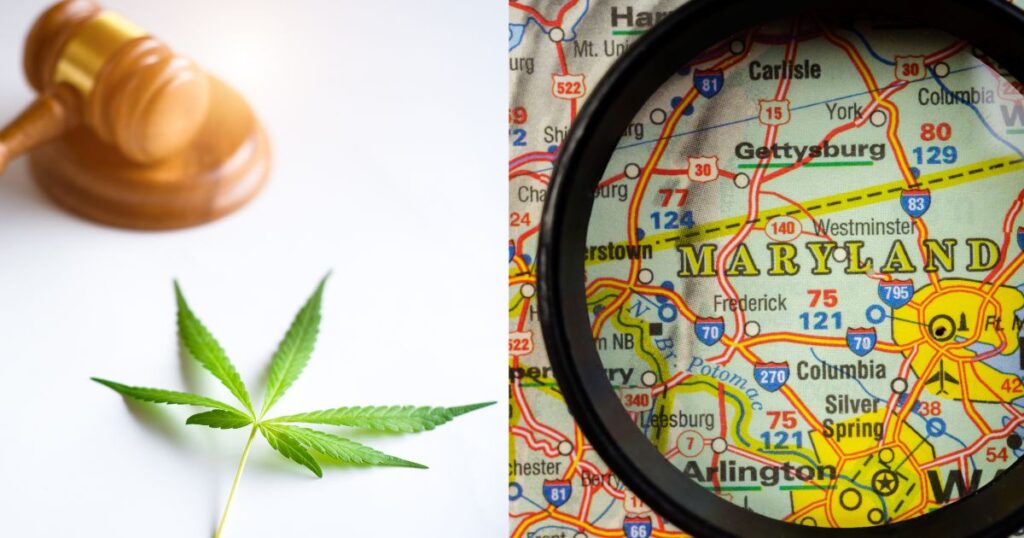Maryland is at a crossroads when it comes to its cannabis market. While legalization efforts have opened doors for safe, regulated, and tested cannabis products, a new wave of tax hikes threatens to stifle the industry’s progress and push consumers back toward the illicit market.
The Maryland House and Senate recently approved budget bills that include a significant hike in sales taxes on adult-use cannabis, jumping from 9% to a proposed 12%, with further discussions pointing to a possible rise to 15% in the coming years. This dramatic change raises important questions about affordability, consumer behavior, and the long-term growth of the state’s legal cannabis industry.
Burden on Maryland Cannabis Consumers
Cannabis customers in Maryland already face premium pricing compared to the unregulated market. Taxes, operational costs from stringent regulations, and licensing fees mean that legal cannabis products cost significantly more than their illicit market counterparts. With this latest tax hike, consumers could see even higher prices at dispensaries—an unwelcome development for price-conscious buyers.
For example, current Maryland Cannabis Administration data shows that cannabis prices have decreased slightly, with the median cost per gram now at $9. But with a 12% tax rate, that cost would tick upward. While that increase might seem marginal on paper, it represents an added burden for regular consumers who purchase in larger quantities over time.
Return to the Illicit Market?
Higher taxes do more than affect consumer costs; they threaten to undo one of legalization’s primary goals—displacing the illicit marijuana market.
The illicit cannabis market thrived for decades before legalization, offering lower prices due to a lack of taxes and regulatory costs. Unfortunately, raising legal cannabis costs widens the price gap, creating an incentive for consumers to pivot back to the unregulated market to save money. While legal dispensaries offer the safety and transparency of lab-tested products, consumers often make decisions based primarily on price, especially if inflation or economic uncertainty is at play.
Aaron Smith, CEO of the National Cannabis Industry Association, commented per the Baltimore Sun, “A tax hike would undoubtedly drive price-sensitive consumers into the illicit market. Not only does this hurt small businesses in the regulated industry, but it also creates public health hazards since underground cannabis products are not tested or held to any safety standards.”
Indeed, Maryland’s lawmakers have acknowledged the challenge of competing with illicit markets. However, relying on the arguments of “higher quality” and “better peace of mind” may not be enough to overcome the financial disparities imposed by excessive taxation.
The Ripple Effect on Cannabis Businesses
It’s not just consumers who will feel the impact of this tax hike. Maryland’s legal cannabis businesses—many of which are still in their nascent stages—face significant challenges in staying competitive.
Smaller cannabis businesses, in particular, may not have the resources to absorb higher costs or make up for potential dips in sales caused by the tax hike. Compounding this issue is the influx of new businesses entering the market, creating fierce competition. Without maintaining a healthy balance between affordability and profits, businesses will struggle to thrive, especially social equity licensees who often take on significant debt to launch their operations.
Mario Macis, an economics professor at Johns Hopkins University’s Carey Business School, explained via the Baltimore Sun, “A tax hike will certainly not encourage growth in the cannabis industry. Smaller firms, which are just setting up shop, will be hit the hardest—they’re going to have to revisit their business models just to stay afloat.”
Is There a Balance Between Sustainability and Revenue?
State officials argue that increasing cannabis taxes could generate an additional $39 million in tax revenue, which will help close Maryland’s $3.3 billion budget deficit. According to a Washington Post-University of Maryland poll, a majority of Maryland residents support some level of tax increase on cannabis if it directly benefits state education and infrastructure.
However, experts caution against an overreliance on cannabis revenue. Raising taxes too high risks stifling the long-term sustainability of the legal cannabis market. Instead, incremental increases coupled with robust investment in market stability might help the state strike a balance between meeting budget goals and supporting this growing industry.
Carter Elliott, a spokesperson for Governor Wes Moore, noted that the administration is confident the tax hike will not undercut legal sales, citing the convenience and quality standards of regulated dispensaries. But as we’ve seen in other states, maintaining this confidence depends heavily on consumer trust and market affordability.
Long-Term Implications for Maryland’s Cannabis Market
Maryland is seen as a leader in regulated cannabis, touted for implementing one of the most equitable and economically successful markets. Recently, the Maryland Senate passed a bill to protect public employees using medical cannabis, and Governor Wes Moore pardoned 175,000 marijuana convictions—further solidifying the state’s commitment to fairness and progress. But maintaining this reputation requires more than high-level vision. It requires lawmakers to take a proactive approach to protect legal cannabis businesses from being taxed out of existence.
If the proposed tax increases take effect without proper guardrails, they could jeopardize the financial health of businesses and undermine public safety goals tied to legalization. Continued growth requires keeping taxes reasonable, maintaining affordable access, and prioritizing consumer loyalty to the legal market.
While the legal cannabis sector has generated over $82 billion in state revenue since legalization, progress remains fragile. It wouldn’t take much to push smaller operators out of the market or to lose consumers to cheaper, unregulated alternatives.















